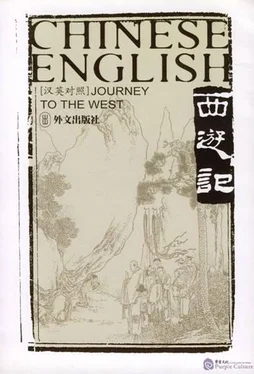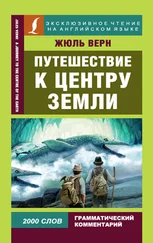Bright Moon and Pure Wind were meanwhile quietly praising Sanzang to each other: “What a splendid monk. He is indeed the beloved sage of the West in mortal form, and his true nature is not at all befuddled. The master told us to entertain him and give him some manfruit as a token of their old friendship, and he also warned us to be on our guard against those hooligans of his. They have murderous-looking faces and coarse natures. Thank goodness he sent them away, because if they were still with him, we wouldn't be able to give him the manfruit.”
“We don't yet know whether this monk is our master's old friend or not,” said Pure Wind. “We'd better ask him to make sure.” The two of them then went over to Sanzang and said, “May we ask you, venerable master, whether you are the Sanzang of the Great Tang who is going to the Western Heaven to fetch the scriptures?”
“Yes, I am,” said Sanzang, returning their bows. “How did you know who I was?”
“Our master told us before he went,” they replied, “to go out to meet you long before you got here, but as you came faster than we expected we failed to do so. Please sit down, teacher, while we fetch you some tea.”
“I am honoured,” said Sanzang. Bright Moon hurried out and came back with a cup of fragrant tea for him.
When Sanzang had drunk the tea, Pure Wind said to Bright Moon, “We must do as our teacher told us and fetch the fruit.”
The two boys left Sanzang and went to their room, where one of them picked up a golden rod and the other a red dish, on which he put many a silk handkerchief as cushioning. They went into the manfruit orchard, where Pure Wind climbed the tree and tapped the fruit with the golden rod while Bright Moon waited below to catch them in the dish.
They only took a few moments to knock down and catch a couple, which they took to the front hall to offer to Sanzang with the words, “This temple of ours is on a remote and desolate mountain, master Sanzang, and there is no local delicacy we can offer you except these two pieces of fruit. We hope they will quench your thirst.”
At the sight of the manfruit the monk recoiled some three feet, shaking with horror. “Goodness me!” he exclaimed. “How could you be so reduced to starvation in this year of plenty as to eat human flesh? And how could I possibly quench my thirst with a newborn baby?”
“This monk has developed eyes of flesh and a mortal body in the battlefield of mouths and tongues and the sea of disputation,” thought Pure Wind, “and he can't recognize the treasures of this home of Immortals.”
“Venerable master,” said Bright Moon, “this is what is called 'manfruit,' and there is no reason why you should not eat one.”
“Nonsense, nonsense,” said Sanzang. “They were conceived by their fathers and mothers and had to go through no end of suffering before they were born. How can you treat them as fruit when they haven't been alive for three days yet?”
“They really and truly grew on a tree,” said Pure Wind.
“Stuff and rubbish,” Sanzang replied. “Babies don't grow on trees. Take them away, you inhuman beasts.”
As he refused absolutely to eat them, the two boys had to take the dish away and go back to their room. This fruit was rather difficult to handle, and did not keep for long without becoming hard and inedible, so the boys sat on their beds and ate one each.
Oh dear! What a thing to happen! There was only a wall separating their room from the kitchen, where their whispering could be clearly heard. Pig was in there cooking the rice when he heard them talk as they fetched the golden rod and the red dish. Later he heard them saying that the Tang Priest had not recognized the manfruit, which was why they took them back to their room to eat.
“I'd love to try one, but I don't know how,” thought Pig, unable to prevent his mouth from watering. Too stupid to do anything about it himself, he had to wait until he could talk it over with Brother Monkey. He had now lost all interest in stoking the stove as he stood in front of it, constantly poking his head outside the kitchen to look for Monkey. Before long Monkey appeared leading the horse, which he tethered to a locust tree. As he came round to the back, the blockhead waved frantically to him and said, “Come here, come here.”
Monkey turned round, came to the kitchen door, and said, “What are you yelling for, idiot? Not enough food for you? Let the old monk eat his fill, then we two can go to the next big house that lies ahead and beg for some more.”
“Come in,” said Pig, “it's not that. Do you know that there's a treasure in this temple?”
“What treasure?” Monkey asked.
“I can't describe it because you've never seen it,” said Pig, “and if I gave it to you, you wouldn't know what it was.”
“Don't try to make a fool of me, idiot,” said Monkey. “When I studied the Way of Immortality five hundred years ago I traveled on my cloud to the comers of the ocean and the edge of the sky. I've seen everything.”
“Have you seen manfruit then?” Pig asked.
“No, I haven't,” said Monkey with astonishment. “But I've heard that manfruit is Grass-returning Cinnabar, and that anyone who eats it lives to a great old age. Where can we get some?”
“Here,” said Pig. “Those boys gave two to our master, but that old monk didn't know what they were and thought they were newborn babies. He wouldn't eat them. Those boys are disgraceful-instead of giving them to us as they should have done they sneaked off into their room and had one each, gobble, gobble, gobble-I was drooling. I wish I knew how I could try one. Surely you've got some dodge for getting into the orchard and pinching a few for us to taste. You have, haven't you?”
“Easy,” said Monkey. “I'll go in and pick some.”
As he rushed out Pig grabbed him and said, “I heard them saying in their room that they needed a golden rod to knock them down with. You must do this very carefully-nobody must know about it.”
“I know, I know,” replied Monkey.
The Great Sage made himself invisible and slipped into the boys' room, only to find that after eating the fruit they had gone to the front hall, where they were talking to Sanzang. Monkey looked all around the room for the golden rod until he saw a two-foot length of gold hanging from the window lattice. It was about as thick as a finger. At the bottom was a lump like a bulb of garlic, and at the top was a hole through which was fastened a green silk tassel. “So this must be what they call the golden rod,” he thought as he took it down. He left the room and pushed open a pair of gates at the back. Goodness! He saw a garden
With red, jeweled balconies
And a twisting artificial hill.
Rare flowers try to outshine the sun,
The bamboo attempts to be bluer than the sky.
Outside the Floating Cup Pavilion
A curve of willows hangs like mist;
Before the Platform to Admire the Moon
Clumps of lofty pines make splashes of indigo.
Bright, bright red,
The pomegranate thicket;
Deep, deep green,
The cushions of grass.
Richly blue
Were the jade-coloured orchids;
Rushing and powerful
The water in the stream.
Crimson cassia blazed beside golden wells and wutong trees.
Brocade-rich locust trees flanked red balconies and steps.
There was peach blossom in pink and white,
Yellow and fragrant chrysanthemums that have seen nine autumns.
Trellises of raspberries
Flourish by the peony pavilion;
Banks of hibiscus
Lead to beds of tree-peonies.
There is no end of noble bamboos that have held out against frost.
Or lordly pines that defy the snows.
Then there are nests of cranes and houses for deer,
Читать дальше









